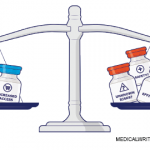The U.S. is in a rebate trap that keeps drug prices high across the system, Dr. Kay said.6 Payers who give biosimilars a preferred tier position on their formularies may then lose rebates from reference product makers, “so it’s only if virtually all of the patients go to the biosimilar does the rebate rap not affect the payer,” he said.
Payers in the U.S. give preferred positions only to the drugs that drive up their profits, not those that boost savings for patients, said Dr. Fleischmann.
ad goes here:advert-1
ADVERTISEMENT
SCROLL TO CONTINUE
“This is the reality of the situation. You can tell me what should be, but that isn’t happening right now. I’m not saying it’s correct, but it’s the reality,” Dr. Fleischmann said.
Susan Bernstein is a freelance journalist based in Atlanta.
ad goes here:advert-2
ADVERTISEMENT
SCROLL TO CONTINUE
References
- Kuhlmann M, Covic A. The protein science of biosimilars. Nephrol Dial Transplant. 2008 Oct 2006;21(suppl 5):v4–v8.
- Schiestl M, Stangler T, Torella C, et al. Acceptable changes in quality attributes of glycosylated biopharmaceuticals. Nat Biotechnol. 2011 Apr;29(4):310–312.
- Jorgensen KK, Olsen IC, Lorentzen M, et al. Switching from originator infliximab to biosimilar CT-P13 compared with maintained treatment with originator infliximab (NOR-SWITCH): A 52-week, randomised, double-blind, non-inferiority trial. Lancet. 2017 Jun;389(10086):2304–2316.
- Glintborg B, Sorensen IJ, Loft AG, et al. A nationwide non-medical switch from originator infliximab to biosimilar CT-P13 in 802 patients with inflammatory arthritis: 1-year clinical outcomes from the DANBIO registry. Ann Rheum Dis. 2017 Aug;76(8):1426–1431.
- Kay J, Schoels MM, Dorner T, et al. Consensus-based recommendations for the use of biosimilars to treat rheumatological diseases. Ann Rheum Dis. 2017 Sep. Epub ahead of print.
- Hakim A, Ross JS. Obstacles to the adoption of biosimilars for chronic diseases. JAMA. 2017 Jun 6;317(21):2163–2164.



